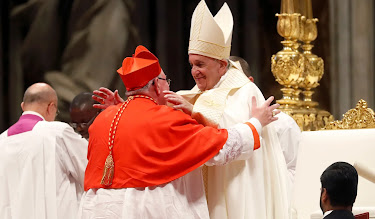Cardinal Hollerich presiding over a spiritual graveyard
A report below showing the rapid decline in belief in Luxembourg, where Cardinal Hollerich has been Archbishop since 2011. While Hollerich synods, his flock apostatise.
He talks about ecological conversion without once mentioning God or Jesus Christ. Doubtless it pleases Pope Francis.
----
Traditional religious practices are in sharp decline in Luxembourg. While 75% of residents believed or practised a religion in 2008, only 48% will do so in 2021, according to Statec.
The importance of religion, membership of a cult, attendance at a place of worship or even the practice of prayer, spirituality and religions were scrutinised in Luxembourg. The answers of the residents questioned on their religious practices mainly revealed that Luxembourgers are less and less religious.
The "very dynamic" Muslim cult in Luxembourg
Conducted at the end of 2020 and the beginning of 2021, this survey by the European Value Survey relayed by Statec reveals that 48% of residents claimed traditional religious beliefs and practices in 2021. This is significantly lower than in 2008 (75%). Among those claiming to belong to a religion, Catholics are in the majority (92%), while believers claiming to be Muslims are only 2.7%.
The data collected show that religion is not very important in Luxembourg. 40.86% of respondents consider it to be 'not at all important', 35.45% consider it to be 'not important', while at the other end of the scale, only 5.27% of respondents consider it to be 'very important'. The insignificance of religion is more pronounced in Luxembourg than in the rest of Europe, where religion is important to 36% of the population.
An alternative spirituality
Of the people questioned, 59% said they never went to a place of worship. While 4% attend once a week and the same proportion once a month, 15.5% only attend religious services on the occasion of festivals or ceremonies.
While only 39% of residents said that 'God was not important in their lives' in 2008, this proportion has risen to 60% in 2021. It is worth noting that the share of residents with no religion has risen from 35% to 44%, while the share of atheists has climbed from 10% to 18%.
In addition to highlighting the decline of traditional religions, this study underlines the rise of alternative spiritualities in Luxembourg. Indeed, 41% of residents believe in "a spirit, a supernatural force". To these people should be added the 15% of respondents who believe that there is a "personal god", and the 18% of agnostics, who do not know. The remaining 21% believe that "there is no god".
If God, in all his forms, is still present, other beliefs also remain. This is the case with life after death, in which 30.7% of those questioned believe, while 40% do not believe and 26.5% do not express an opinion on the subject. Reincarnation convinces 23.6% of respondents, while 61.8% say they do not believe in it. Hell is less popular with only 10.1% of believers.
Thus, "it is difficult to draw the line between traditional religions and modern forms of spirituality," the statisticians note. "Individuals make up their own religious myths and beliefs à la carte."
When compiled, this dataset allows Statec to indicate that people born in Luxembourg, men and left-leaning people show a tendency to be less religious than others, while older people believe more. "God is not dead", concludes the Institute for Economic and Statistical Studies, which stresses that the countries of Eastern and Southern Europe remain very strongly attached to religious principles.










.jpeg)

Comments